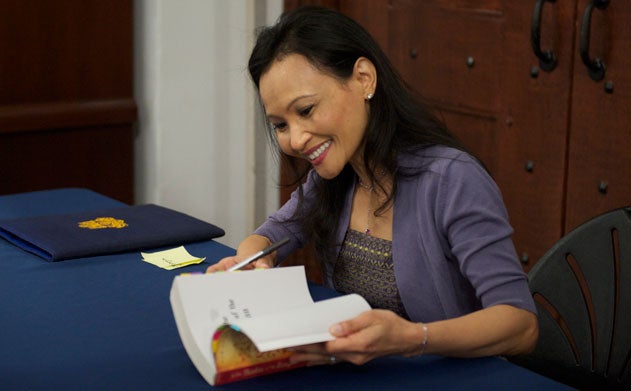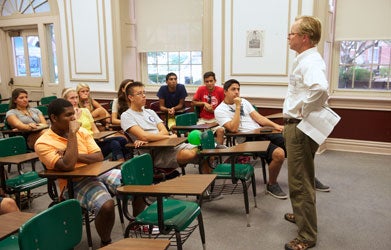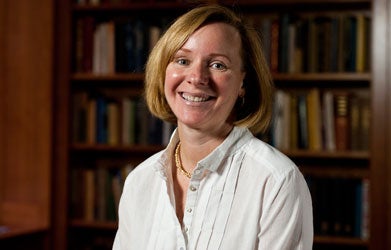Title: Faculty Introduce Students to Intellectual Life Through Refugee’s Book
New students learned from faculty about intellectual inquiry at Georgetown by reading and discussing a book written by a Khmer Rouge refugee, as part of the annual Marino Workshop.

New students at Georgetown got an early taste of intellectual life at Georgetown yesterday as they met with faculty to talk about a 2013 novel written by a Khmer Rouge refugee who came to speak to the entire class.
The exercise was part of Georgetown’s annual Marino Workshop, in which new students read a contemporary book by an international author, write a short reflective essay, hear a lecture by the author and participate in discussions with faculty and other mentors.
“I think it is a great way to provide a common academic point of reference to all first-year students, regardless of their school or interest,” said Bryan McCann, an associate professor of history and a five-time Marino Workshop faculty mentor. “I also like the way it indicates clearly that students are here to learn and engage in scholarly discussion from day one.”
A Refugee’s Tale
This year’s book, In the Shadow of the Banyan by Vaddey Ratner, tells the story of the brutal Khmer Rouge regime in Cambodia between 1975 and 1979 though the eyes of a 7-year-old girl named Raami. Though fiction, the book mirrors the author’s own experience after the regime came into power when she was 5.
Ratner told the new students that she wrote the book to commemorate the struggle that killed members of her family with about 2 million other residents during the regime. She also notes that she spoke no English when she and her mother escaped Cambodia and came to the United States in 1981.
Honoring Lost Lives
 Bryan McCann, associate professor of history, leads a Marino Workshop discussion on In the Shadow of the Bayan.
Bryan McCann, associate professor of history, leads a Marino Workshop discussion on In the Shadow of the Bayan.
“Yet even then, I knew that someday I would have to find a way to tell the story of what we had lived through,” she said, “to try to honor the lives of the loved ones I lost, to honor their sacrifices and courage. It would take me three decades to realize that vision.”
After arriving in America, Ratner went on to become valedictorian of her high school and study Asian politics, literature and culture at Cornell University.
“It was amazing to see Ms. Ratner’s resilience and positivity in person, because it helped explain how she was one of the few blessed with the will to survive something as awful as the Khmer Rouge’s violent takeover and intellectual purge of Cambodia,” said Sam Abrams (B’17) of Overland Park, Kan., who attended McCann’s session.
The book has been translated in 19 languages, was a 2013 PEN/Hemingway Award finalist, and has been selected as an “Editor’s Choice” by The New York Times’ Sunday Book Review.
Events in Context
A total of 89 faculty and staff served as mentors in discussion groups of about 20 students each for the Marino Workshop, which began in 1995 and is funded by alumnus Frederick Marino (SLL’68) and his family. The workshop takes place during Georgetown’s New Student Orientation.
McCann, who teaches courses on Latin America, particularly Brazil, also directs the university’s MA in Global, International and Comparative History (MAGIC).
He asked students in his discussion group to think about how the rise of Khmer Rouge was shaped by preceding and neighboring conflicts, such as the U.S. bombing of Cambodia during the Vietnam War.
Fiction Versus Nonfiction
“The reason that that happened,” McCann explained, “was that the U.S. was fighting the Vietnam War and the North Vietnamese were using Cambodian territory to move troops and material and the U.S. carpet-bombed Cambodia to try and stop that, with devastating effects on the population of Cambodia.”
New student Katherine Landau (B’17) of Ossining, N.Y., noted that Ratner said she cried when she saw pictures of children in Syria because it reminded her of her own childhood in Cambodia.
“I think that it kind of mirrors the reason why she chose fiction over non-fiction,” Landau said in McCann’s session, “because by choosing fiction, she was able to use language to hit our emotions and make us relate to her, and when we relate we feel for people who are in horrible situations.”
Interdisciplinary Experience
 “Students in my section are often surprised that a scientist cares enough about literature to participate in this workshop,” said Maria Donoghue, associate professor of biology, who has participated in the workshop since 2007.
“Students in my section are often surprised that a scientist cares enough about literature to participate in this workshop,” said Maria Donoghue, associate professor of biology, who has participated in the workshop since 2007.
Maria Donoghue, an associate professor of biology, has been participating in the workshop since she started teaching at Georgetown in 2007.
“Students in my section are often surprised that a scientist cares enough about literature to participate in this workshop,” said Donoghue, whose research focuses on the molecular underpinnings of normal brain development. “My presence should remind them that few of us think on a single channel.”
She hopes the students get the message that they are at Georgetown to “think broadly across many disciplines.”
Probing Roots of Violence
Ratner, who also plans to travel to Georgetown’s School of Foreign Service in Doha, Qatar, to talk to new students there, yesterday asked her audience to be cognizant of violent regimes in the world.
“My hope is that Raami’s story moves you in a way that encourages you to probe the roots of violence in our world, the destructive power of unquestioned ideology, and the possibility of seeing some reflection of our selves in the lives and the histories of others no matter how foreign or distant they might be,” she said.
President John J. DeGioia, who introduced Ratner, called the book “compelling,” and told the students he hoped their experience talking about the book and hearing the author speak would help them “more deeply understand [their] own story, [their] own imagination and the threads that bond us together in this community.”
Student Confidence
A number of the new students who participated in the workshop said the experience gave them more confidence about succeeding at one of the nation’s top research universities.
“It’s a good way to ease into the academic way of thinking,” said Neil Sarna (NHS’17) of Glen Rock, N.J. “This definitely makes you feel like you’re on an even footing with everyone else.”
“[The workshop] helps you realize that you have good ideas,” said Joshua Dostal (C’17) of Colorado Springs, Colo. “…everyone is an intelligent person and has something to say, and that’s what you go to college for.”